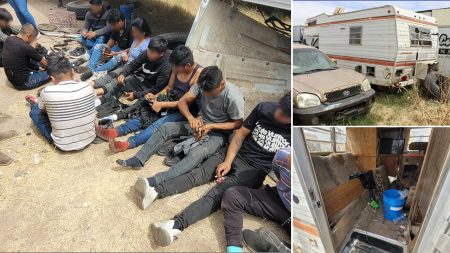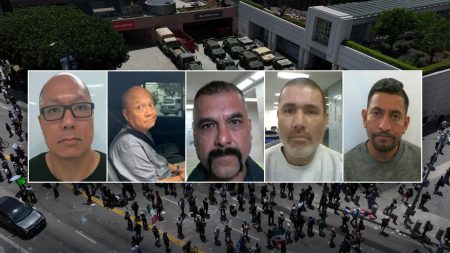The Drug Enforcement Administration (DEA), in collaboration with Homeland Security Investigations (HSI), Immigration and Customs Enforcement (ICE), and the Bureau of Alcohol, Tobacco, Firearms and Explosives (ATF), executed an early morning raid in Adams County, Colorado, targeting the Venezuelan gang Tren de Aragua (TdA). The operation focused on a clandestine, invite-only nightclub suspected of being a hub for drug trafficking and TdA activity. The raid resulted in the apprehension of nearly 50 undocumented immigrants, the seizure of drugs, weapons, and cash, and dealt a significant blow to the gang’s operations in the region. This incident underscores the growing concern over transnational criminal organizations exploiting vulnerable populations and engaging in illicit activities within the United States.
The Tren de Aragua gang, originating in Venezuela, has increasingly expanded its reach throughout South America and beyond, engaging in a wide range of criminal enterprises, including drug trafficking, human smuggling, extortion, and kidnapping. Their presence in Colorado highlights the complex challenges posed by transnational gangs and the need for coordinated law enforcement efforts to disrupt their networks. The DEA’s operation, involving multiple federal agencies, demonstrates a commitment to addressing this growing threat and dismantling criminal organizations that pose a risk to public safety and national security.
The raid in Adams County reflects a broader strategy by the Trump administration to prioritize the apprehension and deportation of criminal undocumented immigrants. This approach, spearheaded by border czar Tom Homan, has led to increased enforcement actions across the country, targeting individuals with criminal records who are residing in the U.S. illegally. The administration’s focus on criminal aliens aims to deter illegal immigration and enhance public safety by removing individuals deemed a threat to communities.
The apprehension of nearly 50 individuals linked to the TdA gang represents a significant success in the ongoing effort to disrupt transnational criminal organizations. The seizure of drugs, weapons, and cash further disrupts the gang’s financial resources and operational capabilities, hindering their ability to conduct illicit activities. This operation sends a strong message that the U.S. government is committed to targeting and dismantling criminal networks operating within its borders, regardless of their origin.
The Trump administration’s immigration policies have been marked by increased enforcement and a focus on border security. The prioritization of criminal undocumented immigrants for deportation reflects a broader strategy to deter illegal immigration and address concerns about public safety. The recent operations in Colorado and other states demonstrate the administration’s commitment to enforcing immigration laws and removing individuals deemed a threat to communities. This approach has sparked debate about the effectiveness and humanitarian implications of these policies, as well as their impact on immigrant communities.
The DEA’s operation against the TdA gang in Colorado highlights the complex challenges posed by transnational criminal organizations. The increasing interconnectedness of the global landscape facilitates the movement of people, goods, and illicit activities, requiring coordinated law enforcement efforts across jurisdictions and international borders. The collaboration between federal agencies in this operation underscores the importance of interagency cooperation in addressing transnational crime and protecting national security. The ongoing efforts to dismantle criminal networks, coupled with broader immigration enforcement strategies, reflect the government’s commitment to addressing the multifaceted challenges posed by illegal immigration and transnational crime.










